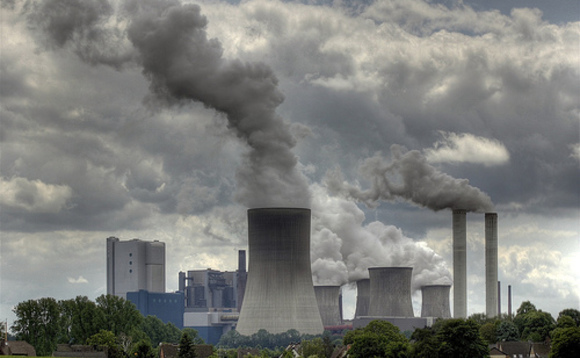
Portfolio: CITIC Capital Partners and Elgin Equipment

When CITIC Capital Partners joined Audax Group in acquiring Elgin Equipment, its brief was to re-position the clean coal equipment business from low-growth America to high-growth China
Coal is destined to remain China's primary source of energy for decades. Sitting on 13% of the world's proven reserves of the mineral, the country consumes almost as much coal as the rest of the world combined, driven by its sheer volume of electricity generation, steel production and cement manufacturing.
The 3.7 billion tons of coal produced in 2012 fed power stations that accounted for 67% of the national electricity supply. New power stations continue to come online as China strives to meet the energy needs of an economy in the midst of industrialization and urbanization. Air pollution is the inevitable, and very visible, cost.
The problems, however, are about process just as much as volume. Once mined, coal in China typically goes unwashed, which means mud remains mixed in with the minerals. This mud cannot be burnt off fully on combustion so it is released into the air alongside the carbon particles, exacerbating the pollution effect.
The government is now paying attention and the 12th Five-Year Plan, a broad policy document covering 2011-2015, stipulates that most of China's coal must be washed. The specific target is to increase the wash rate from the present level of less than 40% to 70% by 2017.
To US-based Elgin Equipment, this policy position represents a huge market opportunity. The company produces coal processing equipment, including centrifuges used to wash soil and rock out of coal, and screeners that dry and group coals of different sizes. Elgin provides the tools through which coal can become cleaner and also generate more energy per ton.
The company is already a market leader in the US, accounting for three in four coal centrifuges and holding a 90% global share in its particular segment of the oil and gas drilling equipment industry. Elgin also generates steady revenue from replacement parts, services and maintenance.
Oil and gas drilling equipment represents the company's biggest revenue generator but there are high hopes for expansion in the clean coal space. This growth will not come in the US, which burns about 1 billion tons of coal per year compared to China's 4 billion tons.
Look east
"If we look at Elgin as a stand-alone US-based business, it's solid but not that fancy. It has steady cash flows with its leading market position, and new growth opportuntities in the oil and gas market. But it's facing a very tough coal market in the US," notes Hanxi Zhao, managing director at CITIC Capital Partners. "However, if the company could build a meaningful business in China, then the overall dynamic for investing shifts. It becomes much more interesting."
This explains CITIC's rationale for buying Elgin in 2011, working in tandem with Boston-based private equity firm Audax Group. Audax sourced the deal and invited CITIC to participate, with a view to further penetrating the China market.
CITIC acquired more than 15% of the company through its third international fund. The three funds have made 28 investments in the US and Europe so far, including 14 platform deals.
"Our strategy is building company through add-on acquisitions as well as expanding globally," says Oliver Ewald, managing director of Audax. "We have known CITIC for many years and understood they can be a valuable partner for company that has significant growth potential in China."
Subsequent to the Elgin deal, the two private equity firms teamed up again in 2012 to buy AavidThermalloy, a US-based manufacturer of thermal management products that dissipate heat in electronic devices and prevent shutdown. China is earmarked as a growth market.
CITIC's minority stake in Elgin reflects the fact that the US remains the company's core customer base and Audax has deeper coverage and wider operational expertise in this geography. CITIC will drive improvements on the China side. Its initial contributions were to the pre-deal due diligence process and also helped identify China National Coal (CNC) Group as a joint venture partner.
"We saw the opportunity in coal, as well as oil and gas in China," Ewald adds. "China was still the minority piece for the whole group when we invested, but it will be an important piece for the growth of the business."
As part of the 12th Five-Year Plan, the Chinese government wants to consolidate the coal industry, creating a small group of large-scale national and regional players. The smaller miners, often beset by safety issues and lacking the capital to invest in equipment and technology, will be merged or shuttered. This is expected to create a smaller and more sophisticated customer base for Elgin.
Given the measures encouraging coal washing, Zhao estimates the domestic market for new centrifuges and screeners will be worth around $150 million. This doesn't include revenues from replacement parts and maintenance revenue, which normally account for 40% of the total.
"The government has set the mandate and we all know they will deliver what they say," she adds. "Essentially the government has created a market for you, but it depends on whether you can grasp the opportunity or not."
Initial frustrations
Elgin first attempted to ramp up its China operations in 2009, setting up a wholly foreign-owned enterprise (WFOE) and importing machinery products from the US for sale to local customers. However, expansion was hindered by a lack of market knowledge and distribution channels, as well as fierce competition from overseas coal washing equipment manufacturers.
The company's principal rivals for supply contracts for Chinese coal processing washing plants are US-based Schenck, Conn-Weld Industries and Birtley and Australia's FL Schmidt Ludowici, Tema Engineers and Aury. Local operators Zhong JI Wei Lin, Aury and Shandong Borun are also present in the market. The general consensus is that global brands are stronger in screeners while their local counterparts produce better centrifuges.
"We are a latecomer to the China market, so our marketing efforts will be critical to gain awareness with customers throughout China," says Manny Menendez, president of Elgin China.
Menendez modified the company's strategy and ditched the WFOE approach in favor of finding a local partner. The domestic coal sector is dominated by state-owned enterprises (SOEs) so Menendez had an obvious place to start. After searching a while, he settled on CNC Group, a coal miner and equipment manufacturer with $35-40 million in annual revenues. CITIC was brought in to help negotiate the joint venture.
"We normally don't like joint ventures because they bring their own problems," says Zhao. "But in this particular case, it makes total sense because the coal sector is government-driven and large SOEs are consolidating market. Elgin also faced a situation in which its competitors were already here, so we quickly decided that a joint venture with an SOE partner would be of help."
The joint venture also represented an unusual breakthrough because the SOE agreed to be the junior partner. CNC Group holds a 49% interest in China National Coal Elgin Mining Machinery, with Elgin owning the rest. The foreign player also has control of the board with five seats to CNC Group's four, while Menendez serves as chairman.
Zhao and Menendez link Elgin's success in securing a majority position in the joint venture to CNC Group's desire to enter the coal-processing business. Put simply, the SOE was willing sacrifice control in return for exposure to its partner's technology and expertise.
CNC Group not only operates a coal-mining business, but also manufactures underground mining equipment through its subsidiary, China National Coal Mining Equipment, which generates revenues of around $2 billion per year. Elgin is primarily involved in above-ground operations on the coal-processing side.
"We are complementary to each other. They are the leader in underground and we're the leader in above ground. We will be very strong force together. When we set up a factory, we can speak in the same language about the equipment. They already know it because they are involved in manufacturing," says Menendez.
Zhao pays tribute to the local management team's efforts in building relations with CNC Group. The CITIC contribution to this was less direct in that it was able to leverage the brand name of its ultimate parent, CITIC Group, one of China's leading industrial conglomerates.
"Our affiliation with CITIC Group helped a lot, especially when talking to an SOE," she explains. "You gain instant credibility with people."
Breaking ground
The joint venture launched at the end of last year and broke ground on a coal chemical factory in the Inner Mongolia city of Erdos. The facility produces centrifuges and screeners, relying on Elgin's intellectual property and systems expertise.
CNC Group is also National Coal Elgin Mining Machinery's biggest customer, using the joint venture as its main supplier of coal-washing equipment. Elgin's China operation is expected to generate initial sales of $20 million a year, moving into the multi-hundred millions once it ramps up production and wider sales and marketing efforts kick in.
"China is adding about one new coal processing washing plant per week, although we expect that velocity to slow down and the replacement of existing equipment at the more than 1,000 older plants to gain significant momentum," says Menendez. "Due to technology advances, especially in our centrifuge line, and pricing advantages, we feel a 10-20% market share is achievable in the next few years."
The joint venture is looking to hire about 80 staff, with CITIC taking the lead in recruitment efforts on the Elgin side. A general manager, controlling managers, sales and operations staff are all required. The private equity firm is also helping the joint venture with supply chain management, finding China suppliers to help accelerate localization of product sourcing, and identifying potential customers.
Audax and CITIC's most likely exit route is a trade sale to strategic investors. Given oil and gas equipment remains Elgin's major business line the buyer would probably come from that industry.
However, should the coal-washing equipment joint venture in China meet growth expectations, other parties may inquire after this asset in particular - either multinationals in the space keen to expand their China footprint or local strategics looking for technology.
Zhao welcomes the prospect of having multiple options, and the enhanced valuations this implies.
"We believe there is a decent chance that we will attract interest from Chinese strategic buyers because the company is a technology leader," she says. "At the end of the day, China is the largest coal market, and there is a need to burn the coal in a cleaner way."
Latest News
Asian GPs slow implementation of ESG policies - survey
Asia-based private equity firms are assigning more dedicated resources to environment, social, and governance (ESG) programmes, but policy changes have slowed in the past 12 months, in part due to concerns raised internally and by LPs, according to a...
Singapore fintech start-up LXA gets $10m seed round
New Enterprise Associates (NEA) has led a USD 10m seed round for Singapore’s LXA, a financial technology start-up launched by a former Asia senior executive at The Blackstone Group.
India's InCred announces $60m round, claims unicorn status
Indian non-bank lender InCred Financial Services said it has received INR 5bn (USD 60m) at a valuation of at least USD 1bn from unnamed investors including “a global private equity fund.”
Insight leads $50m round for Australia's Roller
Insight Partners has led a USD 50m round for Australia’s Roller, a venue management software provider specializing in family fun parks.





